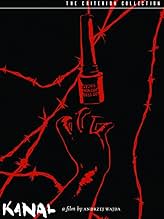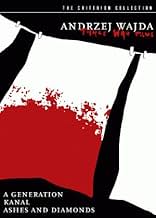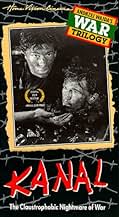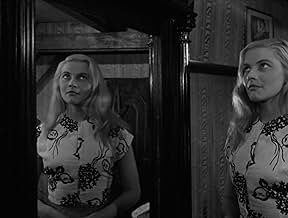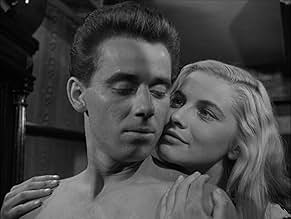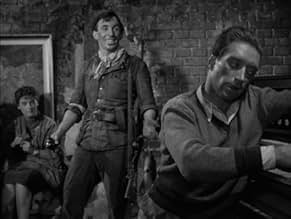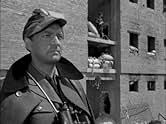CALIFICACIÓN DE IMDb
7.9/10
8.4 k
TU CALIFICACIÓN
Un teniente polaco y sus subordinados usan el drenaje de Varsovia para escapar de los nazis.Un teniente polaco y sus subordinados usan el drenaje de Varsovia para escapar de los nazis.Un teniente polaco y sus subordinados usan el drenaje de Varsovia para escapar de los nazis.
- Nominada a1 premio BAFTA
- 1 premio ganado y 2 nominaciones en total
Vladek Sheybal
- Composer Michal
- (as Wladyslaw Sheybal)
Wlodzimierz Bednarski
- Insurgent
- (sin créditos)
Zenon Dadajewski
- Insurgent
- (sin créditos)
Opiniones destacadas
Watching Andrzei Wajda's war movie 'Kanal' one is stuck just by how short the interval was between the making of this film and the horrors it depicts. And while there were plenty of British and American war films made in the 1950s, it was perhaps easier to turn "our" story into the black-and-white banality of heroic fable, besides which, "we" could also make movies without communist censors looking over our shoulders. Wajda here chooses to fashion a tale centred on the collapse of the Polish resistance to the Nazis: the last survivors take to the sewers, the Germans pump gas down, and you know as soon as the film starts that there will be no happy endings, even for the survivors. It's a tale whose laconic nihilism would be remarkable in any era: I was reminded of the (much later) BBC nuclear-themed drama 'Threads', another tale of underground life facing extinction, while the dialogue, stoical in the face of impossible fate, offers more direct echos, for it made me think of the films of another Polish master, Krystoff Kieslowski. The most remarkable things in this film are the poetically bleak sequence of scenes that end it; it's biggest failing is the score, that (as with many films of this era) feels the need to describe the plot, and not merely to complement it. Occasionally other aspects of the movie also give away its age, but what's much more notable is the modernity (and hopelessness) of its approach to its material. A fine achievement, dating from an era when the events it portrayed were the present, not the past.
I think everyone who saw this film knows that it's a masterpiece, but maybe not everyone knows how authentic the film is. The writer of the screenplay - Jerzy Stefan Stawinski - is in fact the Lieutenant Zadra responsible for his platoon. Stawinski wrote down his own war experiences here with impressing honesty.
Another thing that may be interesting in this film is the main female character - Daisy. She isn't supposed to be a superwoman as some suggested. In fact there were several thousands of women fighting in this uprising. All of them that survived it were given the status of soldiers by Germans. It was the first time in the world's history when women received such a status. During the uprising many of them were carrying mail via sewers, so Daisy is rather a typical character in this role. It would be more surprising if the guide was a man.
Another thing that may be interesting in this film is the main female character - Daisy. She isn't supposed to be a superwoman as some suggested. In fact there were several thousands of women fighting in this uprising. All of them that survived it were given the status of soldiers by Germans. It was the first time in the world's history when women received such a status. During the uprising many of them were carrying mail via sewers, so Daisy is rather a typical character in this role. It would be more surprising if the guide was a man.
Did Andrzej Wajda predict the modern horror film? Or was he merely acting on--and manipulating--our fear of the big, scary monster? There are many shots in KANAL where the camera will simply stay on a passageway seconds after the survivors leave the shot. As a modern audience who has lived through horror films, we expect a Nazi or a monster to slip into the frame in the background, but it never does. KANAL truly is a horror film, but what's unbearable to us and the sturdy group of Resistance fighters isn't the Nazis above the sewers or the metaphorical monster, but it is the solitude and emptiness that drives them to insanity, death or a bitter end.
KANAL is Andrzej Wajda's dirty, bloody valentine to the heroes of the 1944 Warsaw Resistance as the film follows the last hours of a band of heroes in their ultimately futile attempt to escape the Nazis through the labyrinth of underground sewers. We are first introduced to them as strong, willful humans trying to survive in a world that's falling to ruins (One could also argue that Andrzej Wajda also created the first post-apocalypse film). They laugh, they love, they play music in the last happy moments of their lives. After they enter the sewers, we expect and want them to come out even more strong-willed than ever--how many people can face dead bodies floating in the water of a dirty sewer with the same calm defiance? But as time goes on and the group gets separated, it becomes more and more inevitable that these heroes are not meant for a Hollywood's movie's happy, redemptive ending.
Andrzej Wajda, like Roman Polanski, was a real survivor of the Nazi invasion of Poland during WWII, and both became filmmakers who brought their experiences to films, as Polanski did with Oscar-winning THE PIANIST. However, Polanski's film, though absolutely profound, doesn't have Wajda's eye for details--the scenes of ruined Warsaw, for example, seem almost CGI'ed and it's obvious that he's trying to go for more, while Wajda will focus solely on the dirty ground, the debris blowing in the wind, or the flames of a burning building in the background. With Wajda, less is much more effective. If there is a situation more dirty, awful, lonely, scary or haunting than these people making their way through the labyrinths, I have yet to see it.
KANAL is Andrzej Wajda's dirty, bloody valentine to the heroes of the 1944 Warsaw Resistance as the film follows the last hours of a band of heroes in their ultimately futile attempt to escape the Nazis through the labyrinth of underground sewers. We are first introduced to them as strong, willful humans trying to survive in a world that's falling to ruins (One could also argue that Andrzej Wajda also created the first post-apocalypse film). They laugh, they love, they play music in the last happy moments of their lives. After they enter the sewers, we expect and want them to come out even more strong-willed than ever--how many people can face dead bodies floating in the water of a dirty sewer with the same calm defiance? But as time goes on and the group gets separated, it becomes more and more inevitable that these heroes are not meant for a Hollywood's movie's happy, redemptive ending.
Andrzej Wajda, like Roman Polanski, was a real survivor of the Nazi invasion of Poland during WWII, and both became filmmakers who brought their experiences to films, as Polanski did with Oscar-winning THE PIANIST. However, Polanski's film, though absolutely profound, doesn't have Wajda's eye for details--the scenes of ruined Warsaw, for example, seem almost CGI'ed and it's obvious that he's trying to go for more, while Wajda will focus solely on the dirty ground, the debris blowing in the wind, or the flames of a burning building in the background. With Wajda, less is much more effective. If there is a situation more dirty, awful, lonely, scary or haunting than these people making their way through the labyrinths, I have yet to see it.
That this movie was made is a near miracle, since it squeaked out barely 3 years after Stalin died; and the Polish film industry could even begin to suggest that Poles could struggle against the Germans without Soviet "fraternal" help. It looks likely that it was saved from oblivion by the Silver Palm (1957), at least in Poland. My suspicion that this got past the Party censors as a Dantean allegory about the worker and peasant struggles, with each character and episode exposing some lesson. However, like Ashes and Diamonds, much of the real message is just at the surface: regular Poles struggling for a better future.
The real hidden message of the film is a metaphorical struggle against Soviet oppression. Wajda seems to suggest this by quoting Szczepanski(1944): "... But know this: from our tombstones A victorious new Poland will be born And you will not walk this land You Red Ruler of bestial forces!" (1) Indeed the resolution suggests the Stalinist Inferno is far from over. Those who have tried to bring light to the world suffer a Promethean fate.
What seems remarkable to me is the positive spirit, humor, and love of life that most of the characters display in the face of their passage into the underworld. There is additional irony (humorous to me), for example, that the composer attempts to play a particularly patriotic Chopin, but is then ordered to play "something with feeling:" an inane dance tune. (By the way, the Beckstein piano that the composer tries to protect was made by a company that provided Hitler with crucial early support.)
It is also remarkable that such a dark, almost anti-heroic view of combatants was made only 12 years after the event. It is not so far from the spirit of Ernie Pyle, and just think how long it took to make Band of Brothers.
(1) Interview on www.wajda.pl
The real hidden message of the film is a metaphorical struggle against Soviet oppression. Wajda seems to suggest this by quoting Szczepanski(1944): "... But know this: from our tombstones A victorious new Poland will be born And you will not walk this land You Red Ruler of bestial forces!" (1) Indeed the resolution suggests the Stalinist Inferno is far from over. Those who have tried to bring light to the world suffer a Promethean fate.
What seems remarkable to me is the positive spirit, humor, and love of life that most of the characters display in the face of their passage into the underworld. There is additional irony (humorous to me), for example, that the composer attempts to play a particularly patriotic Chopin, but is then ordered to play "something with feeling:" an inane dance tune. (By the way, the Beckstein piano that the composer tries to protect was made by a company that provided Hitler with crucial early support.)
It is also remarkable that such a dark, almost anti-heroic view of combatants was made only 12 years after the event. It is not so far from the spirit of Ernie Pyle, and just think how long it took to make Band of Brothers.
(1) Interview on www.wajda.pl
This is an excellent movie. It tells the story of the last stages of the Warsaw Uprising against the Nazis. A small unit of Polish Resistance fighters are ordered to fall back to a central position by going through the sewers.
Most of the actions happens in the eerie confines of the sewers, which creates a very gripping atmosphere. However, the most interesting aspect of the movie is the character development. All of the characters are so different and changeable. No stereotypical characters in this movie!
Andrzej Wajda is a truly great director. He is able to make unique movies based on the character development, rather than relying on gimmicks to gain the audience's attention. In this movie you never know what is ultimately going to happen to the resistance fighters until the final scenes.
Most of the actions happens in the eerie confines of the sewers, which creates a very gripping atmosphere. However, the most interesting aspect of the movie is the character development. All of the characters are so different and changeable. No stereotypical characters in this movie!
Andrzej Wajda is a truly great director. He is able to make unique movies based on the character development, rather than relying on gimmicks to gain the audience's attention. In this movie you never know what is ultimately going to happen to the resistance fighters until the final scenes.
¿Sabías que…?
- TriviaDirector Andrzej Wajda was himself a fighter in the Polish resistance movement against the Nazis in World War II and several scenes in the film were based on his experiences.
- ErroresWhen Korab is attacking Goliath self-propelled tracked mine, a wire pulling it can be seen.
- Citas
Narrator: These are the tragic heroes: watch them closely in the remaining hours of their lives.
- ConexionesFeatured in Vieras (1984)
Selecciones populares
Inicia sesión para calificar y agrega a la lista de videos para obtener recomendaciones personalizadas
- How long is Kanal?Con tecnología de Alexa
Detalles
- Fecha de lanzamiento
- País de origen
- Sitio oficial
- Idiomas
- También se conoce como
- Kanal
- Locaciones de filmación
- Productora
- Ver más créditos de la compañía en IMDbPro
- Tiempo de ejecución1 hora 31 minutos
- Color
- Mezcla de sonido
- Relación de aspecto
- 1.37 : 1
Contribuir a esta página
Sugiere una edición o agrega el contenido que falta

Principales brechas de datos
By what name was La patrulla de la muerte (1957) officially released in India in English?
Responda
